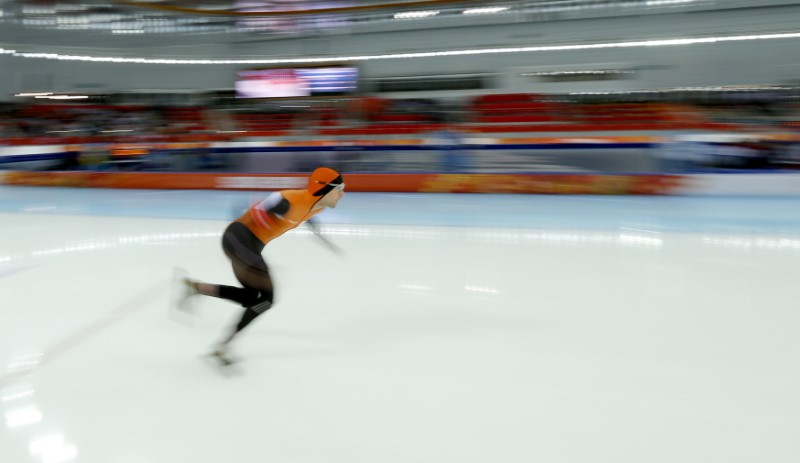
Mark Tuitert of the Netherlands starts as he competes in the men’s 1,500 metres speed skating race during the 2014 Sochi Winter Olympics, February 15, 2014. REUTERS/Issei Kato
November 14, 2017
By Foo Yun Chee
BRUSSELS (Reuters) – European Union antitrust regulators are set to back speed skaters who want to compete in new money-spinning events outside the control of the sport’s governing body, two sources familiar with the matter said on Tuesday.
The European Commission’s move could impact other sports and become as important a milestone as the landmark 1995 court ruling involving Belgian soccer player Jean-Marc Bosman, which paved the way for the free movement of players in the EU.
The ruling could set a precedent that would make it easier for unofficial and ‘breakaway’ events and competitions set up without the approval of a sports’ governing body.
The Commission ruling, which is expected by the end of November or early December, is likely to order the International Skating Union (ISU) to amend its system of penalties, which include lifetime bans for competing in unauthorized events, the sources told Reuters.
The Lausanne-based ISU found itself in the EU competition enforcer’s crosshairs two years ago after Dutch Olympic speed skaters Mark Tuitert and Niels Kerstholt raised grievances after being put off competing in lucrative Ice Derby events run by a South Korean company by threats of a lifetime ban.
“The eligibility rules reveal a manifest conflict of interest between the ISU’s regulatory and commercial functions,” said Ben Van Rompuy, the lawyer for the skaters and a lecturer in competition law at Leiden University in the Netherlands.
“We are eagerly awaiting the Commission’s decision and we are confident that it will set an important precedent to the benefit of European athletes in numerous sports,” he said.
Both the EU’s competition enforcer and the ISU, which has previously said such an approach could destroy the Olympic values underpinning sport, declined to comment on the matter.
PUNITIVE
In its 2016 charge sheet, the Commission said the ISU’s penalties, which range from five-year to lifetime bans, were anti-competitive because they were disproportionately punitive, restricted the athletes’ commercial freedom and prevented new entrant organizers.
James Ogilvie, an EU political and regulatory affairs consultant with expertise in global football, said the case could have repercussions well beyond skating.
“What we are seeing across many professional sports, but in professional football most prominently, is the gradual erosion of the quasi-monopolistic federation-confederation model and an increasing ‘free-marketisation’ of the organization of professional sports competitions.
“This happened because of ‘super-club power’ in the case of Champions League reform last year, after top clubs successfully leveraged a bigger share of the broadcast revenue pie from UEFA against a backdrop of publicity around privately-backed, well-funded and theoretically-advanced breakaway competitions.
“Now, in the ISU case, it is ‘regulator power’ that has the potential to set a precedent that will further the erosion of international federations’ power and ‘open the market’ of sports competition organization far beyond skating,” he added.
In an indication of the wider potential impact of the ruling, International Olympic Committee president Thomas Bach called in June for the protection of what he called the ‘European sports model’.
“Our concern stems from the fact that a purely market-based approach to sport organizations would ignore the social contribution of sport to help achieve objectives of common interest,” said Bach who argued that federations were investing in youth activities.
Bach called on the Commission to “safeguard the volunteer engagement and to protect the European Model of Sport, rather than destroying it by applying the same rules as it does for industries, like car manufacturing or steel production”.
(Reporting by Foo Yun Chee, additional reporting by Simon Evans; editing by Alexander Smith and Gareth Jones)

